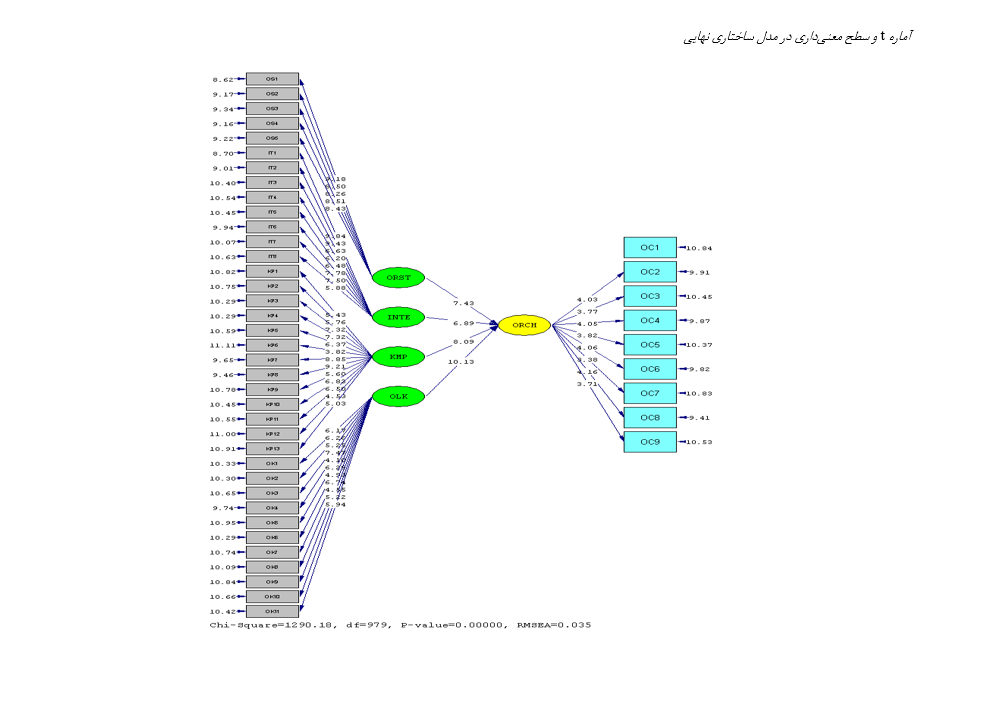بررسی تاثیر زیرساختهای پیاده سازی مدیریت دانش بر ظرفیت تغییر سازمانی (مطالعةموردی: شهرداری منطقه یک تهران)
کلمات کلیدی:
مدیریت دانش , تغییر, تغییر سازمانی , یادگیری سازمانیچکیده
این پژوهش رابطه بین زیرساختهای مدیریت دانش و ظرفیت سازمانی در شهرداری منطقه یک تهران را مورد مطالعه قرار داده است. این تحقیق از نوع توصیفی میباشد که به شیوه همبستگی انجام شده و از نظر نوع هدف کاربردی میباشد. جهت گردآوری دادهها از روش پیمایشی و ابزار پرسشنامه استفاده گردیده است برای طراحی پرسشنامه این تحقیق از پرسشنامه استاندارد مقیمی (1392) و ادبیات موضوع و تحقیقات گذشته استفاده شده است. جامعه آماری این تحقیق، کارکنان شهرداری منطقه یک تهران به تعداد 800 نفر میباشند که برای تعیین اندازه نمونه آماری با استفاده از جدول مورگان و روش نمونه گیری تصادفی ساده تعداد نمونه آماری تحقیق 260 نفر برآورد گردیده است. نهایتاً با استفاده از اطلاعات به دست آمده از پرسشنامه ابتدا با استفاده از تجزیه و تحلیل كمّی از طریق آمار توصیفی، و به وسیله جداول و نمودارها، ارتباط متغیرها بررسی شده و سپس در قسمت آزمون فرضیات، از نرمافزار آماری لیزرل و مدل معادلات ساختاری استفاده گردیده است. نتایج این پژوهش نشان میدهد تاثیر مثبت و معنی داری بین زیرساختهای پیاده سازی مدیریت دانش و ظرفیت تغییر سازمانی وجود دارد.
دانلودها
مراجع
Abbas, J., & Kumari, K. (2023). Examining the relationship between total quality management and knowledge management and their impact on organizational performance: a dimensional analysis. Journal of Economic and Administrative Sciences, 39(2), 426-451. https://doi.org/10.1108/JEAS-03-2021-0046
Ahmadi, R., & Saffari, H. (2024). The Effect of Knowledge-Based Leadership on Company Performance According to the Mediating Role of Customer Knowledge Management and Innovation Quality. Dynamic Management and Business Analysis, 2(4), 13-20. https://doi.org/10.22034/dmbaj.2024.2022216.1009
Akhavan, P., & Heydari, S. (2007). Customer Knowledge Management: An Approach to Gaining Competitive Advantage. Future Management, 5(18), 24-40. https://www.sid.ir/paper/147447/en
Alipour Darvishi, Z. (2014). Compound Model of Islamic Azad University Academic Member's Intent to Knowledge Sharing with the Approach of Perceptual Factors. Journal of Information Technology Management, 6(1), 107-126. https://jitm.ut.ac.ir/article_50053.html
Ashena, M., Asgari, N., Moradi Saleh, A., & Ghafouri, D. (2014). The Role of Organizational Culture in Facilitating Knowledge Management Practices. Journal of Information Technology Management, 5(4), 1-22. https://jitm.ut.ac.ir/article_36051.html
Bahari, B., & Taheri Rouzbahani, M. (2023). Designing an electronic human resources management model based on knowledge creation in knowledge-based companies. Journal of value creating in Business Management, 3(1), 106-121. https://doi.org/10.22034/jvcbm.2023.392785.1082
Bratianu, C., Stănescu, D. F., & Mocanu, R. (2023). The mediating role of customer knowledge management on the innovative work behavior and product innovation relationship. Kybernetes, 52(11), 5353-5384. https://doi.org/10.1108/K-09-2021-0818
Chen, G., Zhang, J., Tan, W., Zhang, S., & Yan, B. (2023). Customer knowledge management competence evaluation of agritourism enterprises by using the balanced scorecard and fuzzy-AHP: Evidence from Chengdu-Chongqing economic circle. PLoS One, 18(2), e0280482. https://doi.org/10.1371/journal.pone.0280482
Dyer, G., & McDonough, B. (2001). The State of KM. http://www.destinationcrm.com/km/dcrm_km_article.asp?id=822&ed=5%2F1%2F01
Hosseini Abadi, H., Rahimi Farimani, M., Mokhamli, A., & Yazdi, M. (2021). Professional Knowledge Management Based on the Dynamic Nature of Organizational Knowledge. 2nd International Conference on Challenges and New Solutions in Industrial Engineering, Management, and Accounting, Damghan,
Khosravi, A. R. M. (2023). Challenges and Stages of Customer Knowledge Management Development in Organizations. Journal of Computing and Distributed Systems, 5(2), 62-74. https://www.jdcs.ir/article_190893.html
Long, J. C. (2000). Managerial concerns in knowledge management. Journal of Knowledge Management, 5(1), 43-57. https://doi.org/10.1108/13673270110384392
Moumivand, H. (2019). Examining the Factors Facilitating the Implementation of Knowledge Management in the Kermanshah Telecommunication Company. Iranian Journal of Information and Communication Technology, 7(25), 87-98. https://jour.aicti.ir/en/Article/1360/FullText
Ng, K. S. P. (2024). How Customer Knowledge Management Helps Retain Fitness Club Members: A Mediating Effect of Relationship Quality. International Journal of Sports Marketing and Sponsorship, 25(2), 360-381. https://doi.org/10.1108/ijsms-07-2023-0136
Nyazie, A., & Abounori, A. (2012). Ranking of Selected Universities Based on Infrastructures of Knowledge Management. Journal of Daneshvar, 1(50), 263-286. https://cs.shahed.ac.ir/article_2153.html
Qazi Zadeh Fard, S. Z., & Ataei, S. S. (2013). Knowledge Management as a Factor in Organizational Effectiveness: An Analysis of the Role of Knowledge Acquisition and Experience in Organizations. Development Quarterly, 8(21). https://elmnet.ir/doc/1556982-45112
Rakhshani, J., & Gheibi, B. (2015). A Review of the Concept of Knowledge Management in Organizations. International Conference on Management and Economics in the 21st Century,
Ranjbar Fard, M., Aghdasi, M., Albadvi, A., & Hassanzadeh, M. (2013). Knowledge Management Barriers Identification for the Four Kinds of Business Processes. Journal of Information Technology Management, 5(1), 61-88. https://jitm.ut.ac.ir/article_30051.html
Sajedi Far, A. A., Esfidani, M. R., & Vahdatzad, M. H. (2012). The Effect of Electronic Services Quality on Trust-Building in Online Customers of Tehran's Brokerage Firms. Journal of Information Technology Management, 4(11), 92-69. https://jitm.ut.ac.ir/article_25001.html
Salman Al-Oda, A. H., Sadeghi, M., Al-Murshidi, R. H. A., & Sharifi, S. (2024). Investigating the Relationship Between Talent Management Implementation Categories in the Basra Province Education Organization [Research Article]. Iranian Journal of Educational Sociology, 7(1), 1-9. https://doi.org/10.61838/kman.ijes.7.1.1
Siri, R., & Esmaeili Qalat, B. (2015). The Role of Knowledge Management in Achieving Competitive Advantage in Organizations. Scientific-Research Quarterly on Global Challenges, 1(3).
Teimourian, M. S., Khodayari, B., & Saeedi, H. (2023). Providing a Customer Relationship Management Model with Emphasis on Customer Knowledge Management in the Banking Industry. Journal of Advertising and Sales Management, 4(2), 253-273. https://asm.pgu.ac.ir/article_703779.html
Vakil, S. M. R., Teymoor Nejad, K., Motadel, M. R., & Moammadi, M. (2022). Presenting a Conceptual framework of Customer Relationship Management in Electronic Banking with Emphasis on Using Business Intelligence Tools (Case Study: Sepah Bank and Merged Banks) (Vol. 26). Tarbiat Modares University. https://mri.modares.ac.ir/article_590_c0f68c50b42743c523713a4980d6ba98.pdf

دانلود
چاپ شده
ارسال
بازنگری
پذیرش
شماره
نوع مقاله
مجوز
حق نشر 2025 تکنولوژی در کارآفرینی و مدیریت استراتژیک

این پروژه تحت مجوز بین المللی Creative Commons Attribution-NonCommercial 4.0 می باشد.










